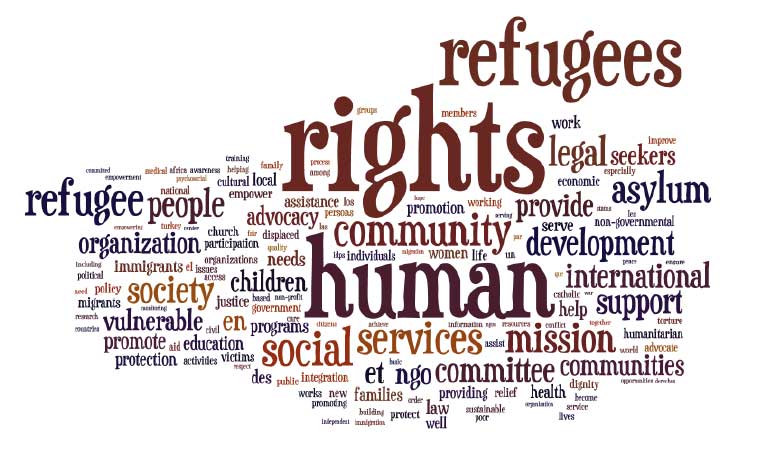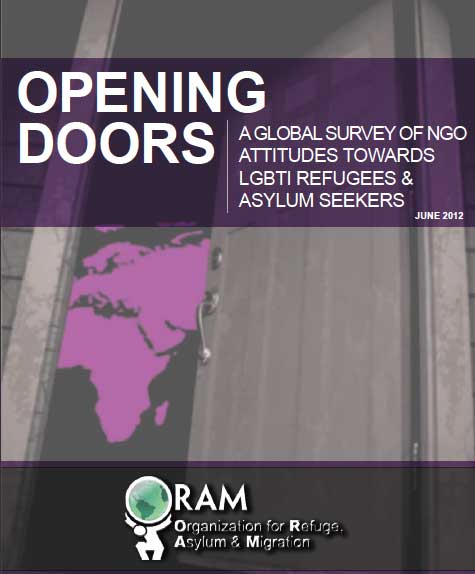Refugee aid groups stumble when faced with LGBTs
Colin Stewart is a 45-year journalism veteran. He is the…

Many refugee protection groups don’t know how to deal with the large numbers of refugees that they encounter who have fled from persecution based on their sexual orientation or gender identity.
That was the conclusion of a first-ever survey of non-governmental organizations (NGOs) serving asylum seekers and refugees worldwide. The survey was conducted last year; its findings were publicized last month. The survey was conducted by Indiana University sociology researchers Oren Pizmony-Levy and Patricia A. McManus in collaboration with the Organization for Refuge, Asylum & Migration (ORAM).

The survey found:
- NGOs often fail to adequately protect lesbian, gay, bisexual, transgender, and intersex (LGBTI) refugees and asylum seekers. The sociologists reported that “less than three‐fourths [of the NGOs] have guidelines that prohibit discrimination based on sexual orientation and gender identity.”
- Many NGOs ignore LGBTI refugees’ particular needs or are ill-equipped to work with LGBTI people.
- Many NGOs, but not a majority of those responding to the survey, refuse assistance to LGBTI refugees.
“Let’s be honest. The refugees, the migrants…who are homosexual or lesbian, they’re frowned upon” the report quoted one survey respondent as saying.
Neil Grungras, executive director of ORAM, said:
“Refugees fleeing persecution because of their sexual orientation or gender identity face further harm from the culture of silence in the international refugee protection system. They are placed in housing where they are exposed to violence, or are compelled to hide the true reason they were persecuted, which puts their legal status in jeopardy.
“Among the most pervasively and violently persecuted in the world, LGBTI individuals are virtually invisible in the international refugee protection realm.”

Respondents in the survey estimated that 34 percent of refugees sought protection on the basis of sexual orientation and 22 percent on the basis of gender identity, among other reasons. The most frequently cited reasons for seeking protection were political opinion (75 percent), race or ethnicity (71 percent), nationality (63 percent), religion (61 percent) and gender (46 percent).
Most respondents said LGBTI people deserve protection as refugees. About 70 percent strongly agreed with that position, about 3 percent strongly disagreed, and about 14 percent refused to answer the question.
That applied even when a religious group’s theology created “a tension between being a faith‐based organization and homosexuality,” the researchers’ report said. They cited several comments from respondents in faith-based NGOs:
- “Supporting a group of homosexual, bisexual and lesbian is a sin, because our religion
prohibits these acts. But if they need humanitarian aid you have to support whatever
they are.” - “As a Christian organization, these issues of gender and sexual identity present an
interesting challenge. I believe it is possible to stand firm on our beliefs in what is right
or wrong, while still showing compassion and providing services to vulnerable clients,
regardless of their lifestyle, etc., particularly when persecution is involved.” - “As a Catholic organization we are committed to serving all people who are in need. The questions you ask seemed particularly pointed toward a population that is very difficult to address without offending people on one side or another. The Catholic teaching is very clear on homosexuality. The person is to be loved and cared for but in a manner that does not condone or support the person’s sexual behavior.”
- ”While we are a Jesuit organization, under the authority of the Catholic Church […] we
offer services to refugees, asylum seekers and the forcibly displaced regardless of their
nationalities, religions or sexual identities.”

“There appears to be a vicious cycle,” Pizmony-Levy said. “Many NGOs do not welcome LGBTI refugees and the asylum seekers don’t approach them. NGOs think that persecution based on sexual orientation or gender identity is not serious and NGOs tend to overlook the problem.”
Many NGOs told researchers that they wanted to be able to serve LGBTI refugees better.
In response to the problem, ORAM proposed:
- NGOs should affirmatively create non-threatening and welcoming environments for LGBTI individuals, encouraging staff to openly engage with issues of sexual orientation and gender identity while avoiding stereotypes and assumptions;
- NGOs should build their knowledge and capacity on core LGBTI issues through ongoing, context-specific sensitization trainings; and
- NGOs should adopt codes of conduct preventing discrimination on the basis of sexual orientation and gender identity.
Respondents to the survey came from 384 NGOs in 100 countries.
For more information, read:
- The ORAM report, titled “Opening Doors: A Global Survey of NGO Attitudes Towards LGBTI Refugees & Asylum Seekers.”
- The Indiana University technical report “Global Survey of Non‐Governmental Organizations Serving Refugees and Asylum Seekers.”
Related articles
- New guidebook tells how to welcome LGBTI refugees (76crimes.com)
- LGBT Refugees Face Difficult Time Even From Those Who Help Refugees (lezgetreal.com)
- Gay African refugees face abduction, violence and rape in Uganda and Kenya (guardian.co.uk)
- AFRICA: “Sexual refugees” struggle to access asylum (Irinnews.org)



